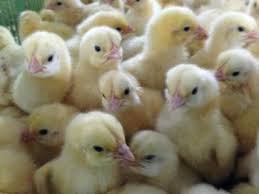The main objective in brooding chicks is to efficiently and economically provide a comfortable, healthy environment for growing birds. Temperature, air quality, humidity and light are critical factors to consider.
Failure to provide the adequate environment during the brooding period will reduce profitability, resulting in reduced growth and development, poorer feed conversion, and increased disease, condemnation and mortality.
2- to 3-week-old baby chicks grow quickly and change each day. To continue giving them a strong start, keep the brooder clean and warm, offer complete starter-grower feed and fresh water.
Listen to the chicks to ensure their happiness; content chicks will roam freely around the brooder and emit a soft cheeping sound.
Management of Day Old Chicks (D.O.C) till 6th Week

Heat: Heat should be supplied to the chicks from one to six weeks old. The brooder guards should be removed when most of the chicks can fly over the guards during the cold period.
However, brooder guards could be removed after two weeks during the hot season.
Excessive Heating: This is one of the things you should try to avoid when the weather is too hot for the chicks, they behave sluggishly and loss appetite.
To avoid this unpleasant situation, you must make sure that you give the required temperatures to chicks at all times by using a Thermometer properly.
Excessive Cold: When the temperature is too cold for the chicks you would notice that chicks will accumulate under the electric bulbs, cry loudly and this can make the chicks fall sick easily.
Normal Temperature: When the temperature is normal, chicks could be seen to be very lively, evenly distributed/scattered, eating and drinking.
Read Also: Nutritional Deficiency and How it affects Poultry Birds
Caring for Baby Chicks

Provide light to chicks:
After the first week, reduce the number of light hours to 10-12 hours per day. Use one 25-watt bulb for each 100 square feet (10’ x 10’) of floor space.
Adjust temperature for baby chicks:
The biggest change you’ll need to make this week is temperature. Older chicks do not need it to be quite as warm. During week one, the temperature should be 95°F.
Starting at week two, lower the temperature by 5° each week until you reach a minimum of 70°F at week six. If using a radiant heater, adjust the heater height to account for the growth of the birds.
Remove brooder guard:
Chicks should be able to find the heat source by day ten. At that time, you can remove the inside brooder guard if you have one.
Keep the chick brooder clean:
Remove any foreign material in the chick feeders and waters daily. Wash the waterers once a week with soap and water. Keep bedding dry (we recommend pine shavings) by removing wet and soiled litter each day and replacing it with clean, dry bedding.
Listen to your chicks:
When everything is right, chicks will emit a soft cheeping. A chick that is stressed will have a shrill, higher pitched or very rapid cheep. Translate this as a call for help and look for the problem. Stress could be caused by chicks being too hot or cold, wet litter or they may be hungry.
Move chick feeders and waterers:
After the brooder guard is taken out, move the feeders and waterers farther from the heat source. This will give chicks more space for exploring as they become more active.
It can also help keep the feeders and waterers cleaner and from being heated by the heat lamp. Raise the chick feeders and waterers until they are at back height of the growing birds.
Remove training feeders:
If you haven’t done so by now, remove the training feeders. Make sure chicks always have starter-grower feed and water. The level of feed in the feeders can be decreased a little each week until they remain at least half full. This will help reduce the amount of animal feed waste.
Read Also: Poultry Vaccination / Medication Program, Dosage and Position / Method of Administration
Management of Chicks in the Brooder

- Adjust the temperature as per the requirement of the chicks. In the case of oil heating, see that there is no defect in the stove or lamp. Chicks should not have access to the heated parts of the lamp at any cost.
- Avoid a damp poultry house. You can use a deep litter system.
- Discourage litter eating by the chicks, scatter mash over egg case flats when the chicks are first taken out of their boxes.
- Provide balanced standard feed mash.
- Keep provision for the entrance of fresh air.
- Provide clean, fresh water in front of the birds at least twice daily.
- Chicks, after 3 weeks old may be provided chopped green grasses (to increase Vitamin A intake)
- Clean the brooders including feed hoppers daily.
- Follow a regular vaccination program.
- Avoid overcrowding as this will lead to slow growth and mortality.
- Keep the brooder in such a place that cold wind and rain does not get in.
- Daily inspect the condition of birds and their faces for any sort of abnormality.
- Keep in touch with any veterinarian for help at the time of need.
- It is always advisable to check the fittings, temperature control, feed, and water trough arrangement before shifting the chicks in the brooder.
Read Also: Comprehensive Guide on How to start Cockerel Farming Business
Frequently Asked Questions
We will update this section soon.

